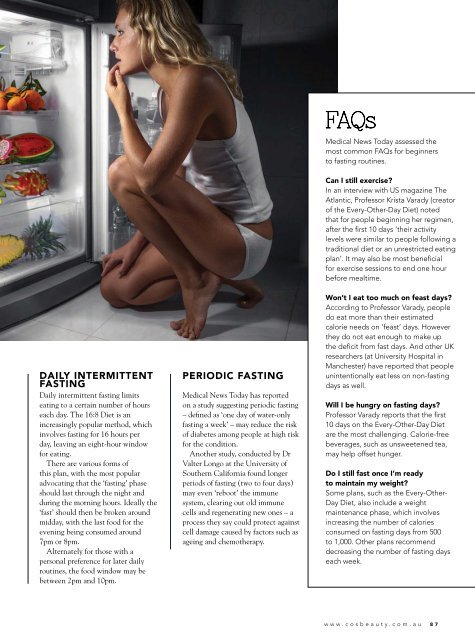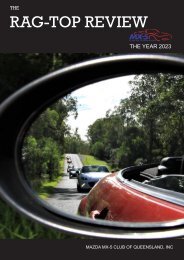CosBeauty Magazine #85
CosBeauty is the #BeautyAddict's guide to lifestyle, health and beauty in Australia. In this issue: - The Breast Report - your guide to augmentation - Put an end to bad hair days - 24 hour makeup, products that last - Sex appeal - do you have it?
CosBeauty is the #BeautyAddict's guide to lifestyle, health and beauty in Australia.
In this issue:
- The Breast Report - your guide to augmentation
- Put an end to bad hair days
- 24 hour makeup, products that last
- Sex appeal - do you have it?
Create successful ePaper yourself
Turn your PDF publications into a flip-book with our unique Google optimized e-Paper software.
FAQs<br />
Medical News Today assessed the<br />
most common FAQs for beginners<br />
to fasting routines.<br />
Can I still exercise?<br />
In an interview with US magazine The<br />
Atlantic, Professor Krista Varady (creator<br />
of the Every-Other-Day Diet) noted<br />
that for people beginning her regimen,<br />
after the first 10 days ‘their activity<br />
levels were similar to people following a<br />
traditional diet or an unrestricted eating<br />
plan’. It may also be most beneficial<br />
for exercise sessions to end one hour<br />
before mealtime.<br />
Daily Intermittent<br />
Fasting<br />
Daily intermittent fasting limits<br />
eating to a certain number of hours<br />
each day. The 16:8 Diet is an<br />
increasingly popular method, which<br />
involves fasting for 16 hours per<br />
day, leaving an eight-hour window<br />
for eating.<br />
There are various forms of<br />
this plan, with the most popular<br />
advocating that the ‘fasting’ phase<br />
should last through the night and<br />
during the morning hours. Ideally the<br />
‘fast’ should then be broken around<br />
midday, with the last food for the<br />
evening being consumed around<br />
7pm or 8pm.<br />
Alternately for those with a<br />
personal preference for later daily<br />
routines, the food window may be<br />
between 2pm and 10pm.<br />
Periodic Fasting<br />
Medical News Today has reported<br />
on a study suggesting periodic fasting<br />
– defined as ‘one day of water-only<br />
fasting a week’ – may reduce the risk<br />
of diabetes among people at high risk<br />
for the condition.<br />
Another study, conducted by Dr<br />
Valter Longo at the University of<br />
Southern California found longer<br />
periods of fasting (two to four days)<br />
may even ‘reboot’ the immune<br />
system, clearing out old immune<br />
cells and regenerating new ones – a<br />
process they say could protect against<br />
cell damage caused by factors such as<br />
ageing and chemotherapy.<br />
Won’t I eat too much on feast days?<br />
According to Professor Varady, people<br />
do eat more than their estimated<br />
calorie needs on ‘feast’ days. However<br />
they do not eat enough to make up<br />
the deficit from fast days. And other UK<br />
researchers (at University Hospital in<br />
Manchester) have reported that people<br />
unintentionally eat less on non-fasting<br />
days as well.<br />
Will I be hungry on fasting days?<br />
Professor Varady reports that the first<br />
10 days on the Every-Other-Day Diet<br />
are the most challenging. Calorie-free<br />
beverages, such as unsweetened tea,<br />
may help offset hunger.<br />
Do I still fast once I’m ready<br />
to maintain my weight?<br />
Some plans, such as the Every-Other-<br />
Day Diet, also include a weight<br />
maintenance phase, which involves<br />
increasing the number of calories<br />
consumed on fasting days from 500<br />
to 1,000. Other plans recommend<br />
decreasing the number of fasting days<br />
each week.<br />
www.cosbeauty.com.au 87


















